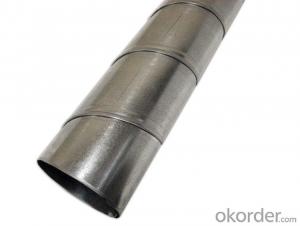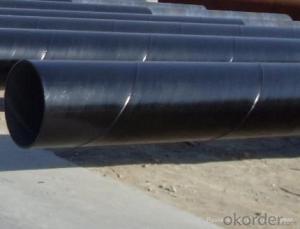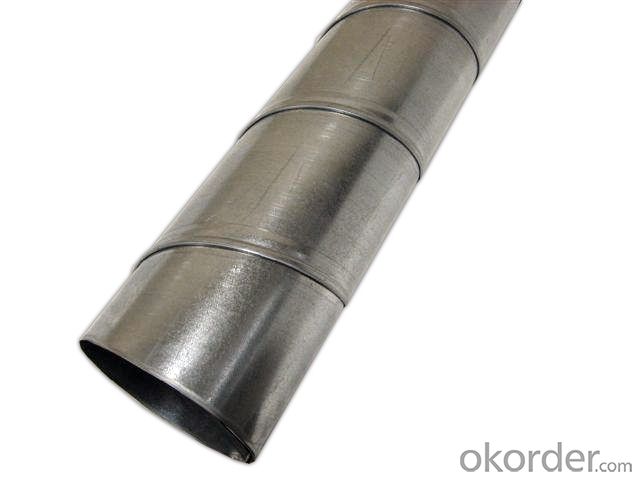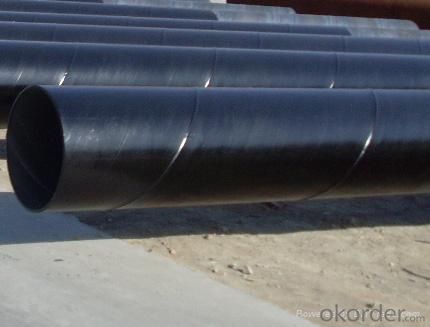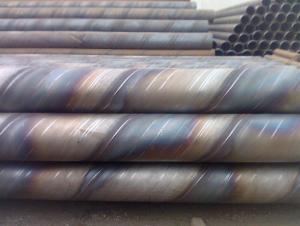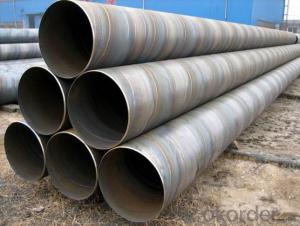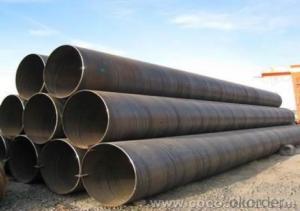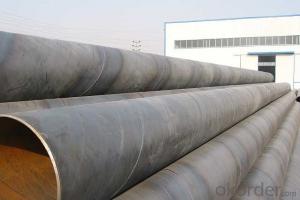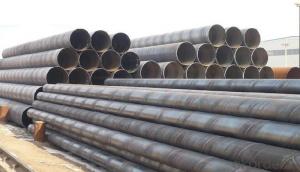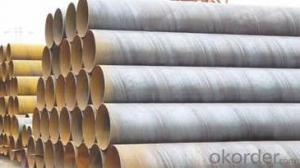SPIRAL STEEL PIPE 24’‘ 26’‘ 28’‘ 32’‘ ASTM API LARGE DIAMETER PIPE
- Loading Port:
- Tianjin
- Payment Terms:
- TT OR LC
- Min Order Qty:
- 5 m.t.
- Supply Capability:
- 3000 m.t./month
OKorder Service Pledge
OKorder Financial Service
You Might Also Like
Packaging & Delivery
Packaging Detail: | standard export packing or as customer's requirement |
Delivery Detail: | within 10 - 30 days |
Specifications
Spiral Welded Steel Pipes and Tubes
1.Material:Q195-Q235
2.Length:1-12m
3.WT:1.0-14mm
4.O.D.:20-273mm
Spiral Welded Steel Pipes and Tubes
Product Description:
1.Material : Q235,Q345,L245,L290,L360,L415,L450,L485,GrB,X42,46,X52,X56,X60,X65,X70,X80,X100
2,Standard: SY/T5037-2000,GB/T9711-2011,API Spec 5L PSL1/PSL2,ASTM A252\A53,ISO3183,DIN17172,EN10217,JIS G3457,AWWA C200,ASTM A139,ASTM A671,ASTM A672
3.Wall thickness: 3.0mm-30mm
4.Outer diameter: φ168mm-3020mm
5,Length: 5m-12m or as your requirement
6,Corrosion protection standard: DIN30670,DIN30671, AWWAC210, AWWA C203, SY/T0413-2002,SY/T0414-2002
7,Application: Oil, gas, natural gas, water pipe, thermal electricity pipe, steel structure engineering, etc
Q195-q345 Material Steel Pipe's Materials
Elements | Chemical Compsition% | Mechanical Property | ||||||
C% | Mn% | S% | P% | Si% | Yield Point (Mpa) | Tensile Strength(Mpa) | Elongation | |
Q195 | 0.06-0.12 | 0.25-0.50 | <0.050< span=""> | <0.045< span=""> | <0.030< span=""> | >195 | 315-430 | 32-33 |
Q215 | 0.09-0.15 | 0.25-0.55 | <0.05< span=""> | <0.045< span=""> | <0.030< span=""> | >215 | 335-450 | 26-31 |
Q235 | 0.12-0.20 | 0.30-0.70 | <0.045< span=""> | <0.045< span=""> | <0.030< span=""> | >235 | 375-500 | 24-26 |
Q345 | <0.20< span=""> | 1.0-1.6 | <0.040< span=""> | <0.040< span=""> | <0.55< span=""> | >345 | 470-630 | 21-22 |
- Q: How do steel pipes handle thermal expansion and contraction?
- Steel pipes handle thermal expansion and contraction by allowing for slight movement and flexibility. When heated, the steel pipe expands, and when cooled, it contracts. To accommodate these changes, expansion joints or loops are often incorporated into the pipe system. These joints or loops allow the pipe to expand and contract without causing stress or damage. Additionally, proper insulation and support are essential to minimize the effects of thermal expansion and contraction on steel pipes.
- Q: What is the compressive strength of steel pipes?
- The compressive strength of steel pipes can vary depending on the specific grade and manufacturing process, but it is generally high. On average, steel pipes have a compressive strength ranging from 60,000 to 120,000 pounds per square inch (psi).
- Q: What is the fatigue strength of steel pipes?
- The fatigue strength of steel pipes refers to the maximum stress level that the pipes can endure without experiencing fatigue failure or damage over a given number of stress cycles. It varies depending on factors such as the steel composition, manufacturing process, pipe dimensions, and environmental conditions.
- Q: Can steel pipes be used for oil well casing?
- Yes, steel pipes can be used for oil well casing. They are commonly used in the oil and gas industry due to their durability, strength, and ability to withstand high pressure and extreme conditions found in oil wells.
- Q: How do you prevent corrosion in steel pipes?
- One effective way to prevent corrosion in steel pipes is by applying a protective coating, such as paint or epoxy, to the surface of the pipes. This barrier creates a physical barrier between the pipe and the surrounding environment, preventing moisture and corrosive agents from coming into direct contact with the steel. Additionally, regular inspection and maintenance of the pipes, including cleaning and repairing any damaged coating, can help identify and address potential issues before they lead to corrosion.
- Q: Can steel pipes be used for sewage disposal systems?
- Yes, steel pipes can be used for sewage disposal systems. Steel pipes are commonly used for underground sewage lines due to their durability and resistance to corrosion. They can efficiently transport sewage from residential, commercial, or industrial areas to sewage treatment plants or disposal sites.
- Q: How are steel pipes protected during transportation?
- Steel pipes are typically protected during transportation through a variety of means such as wrapping them with protective coatings, using plastic or metal caps to cover the ends, and securing them with straps or bands to prevent any movement or damage. Additionally, they may be placed in crates or on pallets and secured with stretch film or shrink wrap for added protection.
- Q: How seamless steel tube is formed?
- Seamless steel tubes are formed by cold drawing and hot rolling.
- Q: What are the common applications of seamless steel pipes?
- Due to their unique properties, seamless steel pipes are widely used in various industries. Here are some of the most common applications: 1. The oil and gas industry extensively utilizes seamless steel pipes for transporting oil, gas, and other fluids. These pipes are preferred because of their high strength, durability, and resistance to corrosion, making them suitable for harsh environments. 2. Seamless steel pipes are extensively used in construction projects, such as building, bridge, and tunnel construction. They are ideal for structural applications due to their ability to withstand heavy loads and provide excellent strength and stability. 3. The automotive industry relies on seamless steel pipes for manufacturing automotive parts, including exhaust systems, engine components, and hydraulic systems. These pipes offer high strength, reliability, and resistance to heat, making them suitable for demanding automotive applications. 4. Various mechanical and engineering applications benefit from the usage of seamless steel pipes. They are commonly used for carrying fluids, gases, and steam, as well as for transmitting power in machinery and equipment. 5. Power plants extensively utilize seamless steel pipes for transporting steam and hot water. These pipes are capable of withstanding high pressure and temperature, making them ideal for power generation applications. 6. The petrochemical industry heavily relies on seamless steel pipes for transporting chemicals, gases, and liquids. These pipes have excellent resistance to corrosion, which is essential when dealing with hazardous and corrosive substances. 7. The mining industry utilizes seamless steel pipes for various applications, including the transportation of slurry, water, and other mining-related fluids. These pipes offer durability, reliability, and resistance to abrasion, making them suitable for the challenging mining environment. 8. The aerospace industry finds applications for seamless steel pipes in manufacturing aircraft components, such as hydraulic systems, fuel lines, and structural parts. These pipes provide a high strength-to-weight ratio and resistance to extreme temperatures and pressure. Overall, seamless steel pipes play a crucial role in a wide range of industries. Their exceptional properties, including strength, durability, resistance to corrosion and high temperatures, make them an essential component in various industrial processes and infrastructure development.
- Q: Is the steel frame on each floor supporting formwork (floor) called full scaffolding?
- The use of scaffold as its height, when the ceiling height below 3.6M, no matter what the ceiling decoration, decorative scaffolding are calculated
Send your message to us
SPIRAL STEEL PIPE 24’‘ 26’‘ 28’‘ 32’‘ ASTM API LARGE DIAMETER PIPE
- Loading Port:
- Tianjin
- Payment Terms:
- TT OR LC
- Min Order Qty:
- 5 m.t.
- Supply Capability:
- 3000 m.t./month
OKorder Service Pledge
OKorder Financial Service
Similar products
Hot products
Hot Searches
Related keywords
